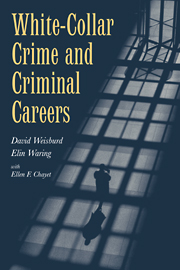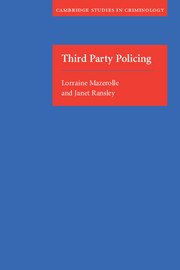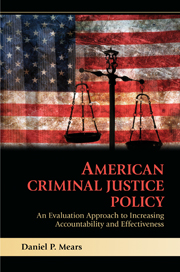Place Matters
Criminology for the Twenty-First Century
£95.00
- Authors:
- David Weisburd, Hebrew University of Jerusalem and George Mason University, Virginia
- John E. Eck, University of Cincinnati
- Anthony A. Braga, John F. Kennedy School of Government, Massachusetts
- Cody W. Telep, Arizona State University
- Breanne Cave, George Mason University, Virginia
- Kate Bowers, University College London
- Gerben Bruinsma, VU University Amsterdam
- Charlotte Gill, George Mason University, Virginia
- Elizabeth R. Groff, Temple University, Philadelphia
- Julie Hibdon, Southern Illinois University, Carbondale
- Joshua C. Hinkle, Georgia State University
- Shane D. Johnson, University College London
- Brian Lawton, John Jay College of Criminal Justice, City University of New York
- Cynthia Lum, George Mason University, Virginia
- Jerry H. Ratcliffe, Temple University, Philadelphia
- George Rengert, Temple University, Philadelphia
- Travis Taniguchi, RTI International, North Carolina
- Sue-Ming Yang, George Mason University, Virginia
- Date Published: July 2016
- availability: Available
- format: Hardback
- isbn: 9781107029521
£
95.00
Hardback
Other available formats:
Paperback, eBook
Looking for an inspection copy?
This title is not currently available on inspection
-
Over the last two decades, there has been increased interest in the distribution of crime and other antisocial behavior at lower levels of geography. The focus on micro geography and its contribution to the understanding and prevention of crime has been called the 'criminology of place'. It pushes scholars to examine small geographic areas within cities, often as small as addresses or street segments, for their contribution to crime. Here, the authors describe what is known about crime and place, providing the most up-to-date and comprehensive review available. Place Matters shows that the study of criminology of place should be a central focus of criminology in the twenty-first century. It creates a tremendous opportunity for advancing our understanding of crime, and for addressing it. The book brings together eighteen top scholars in criminology and place to provide comprehensive research expanding across different themes.
Read more- The book summarizes more than three decades of research on crime and place and provides a comprehensive review of what is known about the subject
- With an extensive review across different themes within the subject matter, the book provides a variety of different perspectives
- The book lays out an agenda for future research in crime and place, and therefore sets the groundwork for a future generation of studies
Reviews & endorsements
'Any serious criminologist needs to be thoroughly conversant with this outstanding book. Written by a team of leading scholars, it offers a criminology for the twenty-first century by showing that place is central to explaining and controlling crime.' Ron Clarke, Rutgers University, New Jersey
See more reviews'At a time when the criminological imagination is often blunted by an allegiance to increasingly dated theories, a focus on place promises to illuminate fresh ways of thinking about crime and novel avenues for empirical investigation. More importantly, a place perspective offers one of the few hopes for criminologists to contribute to the daunting challenge of reducing crime and saving lives. Indeed, Place Matters should become a standard course text – a volume used to enrich how the next generation of scholars and practitioners understands crime and its prevention.' Francis T. Cullen, University of Cincinnati
'A brilliant and timely book … The authors cover the state of the art and future research for place-based research in an easily digestible form. Place Matters will, no doubt, become an instant classic and should be required reading for students and scholars in criminology.' Martin A. Andresen, Simon Fraser University, British Columbia
'Place Matters … provides an orienting overview of the last three-plus decades of research and theory on spatial crime dynamics and patterns, argues forcefully for placing such work squarely in the spotlight of mainstream criminological theory, and challenges the next generation of scholars to use the crime concentration constant as an organizing guidepost for further theoretical, practical, and policy advancement … The volume is certain to inspire widespread discussion and reflection on the past, present and future of the field.' R. B. Taylor, Temple University, Philadelphia
'Place Matters is a thought-provoking and essential read for everyone interested in the role of micro-environments in crime causation and prevention.' Per-Olof H. Wikström, FBA, University of Cambridge
'The book … does not stint on theory, drawing for example on the pioneering sociologist Durkheim, and raises some discomforting questions for all of us.' Mark Rowe, Professional Security Magazine Online (www.professionalsecurity.co.uk)
'In Place Matters: Criminology for the Twenty-First Century, 18 leading criminologists have teamed to produce an accessible, tightly written account of this extraordinarily important insight. The book is a great contribution to the literature, and deserves to be carefully studied and widely read. … If scholars and law enforcement follow this research through to its natural conclusion, the results can be transformative. At the theoretical level, the research can bridge opportunity and social disorganization theories, which have hitherto provided radically different explanations for crime.' Joseph Margulies, Criminal Law and Criminal Justice Books (www.clcjbooks.rutgers.edu)
'… an up-to-date and authoritative review of findings concerning the role of place in crime …' Journal of Criminal Justice Education
Customer reviews
Not yet reviewed
Be the first to review
Review was not posted due to profanity
×Product details
- Date Published: July 2016
- format: Hardback
- isbn: 9781107029521
- length: 200 pages
- dimensions: 235 x 156 x 17 mm
- weight: 0.43kg
- contains: 29 b/w illus. 5 tables
- availability: Available
Table of Contents
1. Crime places within criminological thought
2. The concentration of crime at place
3. Theories of crime and place
4. The importance of place in mainstream criminology and related fields: influences and lessons to be learned
5. Methods of place-based research
6. Reducing crime at high crime places: practice and evidence
7. Crime places in the criminological imagination.
Sorry, this resource is locked
Please register or sign in to request access. If you are having problems accessing these resources please email [email protected]
Register Sign in» Proceed
You are now leaving the Cambridge University Press website. Your eBook purchase and download will be completed by our partner www.ebooks.com. Please see the permission section of the www.ebooks.com catalogue page for details of the print & copy limits on our eBooks.
Continue ×Are you sure you want to delete your account?
This cannot be undone.
Thank you for your feedback which will help us improve our service.
If you requested a response, we will make sure to get back to you shortly.
×





